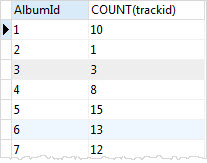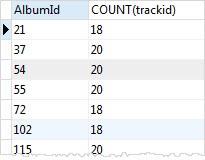Summary: in this tutorial, you will learn how to use SQLite HAVING clause to specify a filter condition for a group or an aggregate.
Introduction to SQLite HAVING clause
SQLite HAVING clause is an optional clause of the SELECT statement. The HAVING clause specifies a search condition for a group.
You often use the HAVING clause with the GROUP BY clause. The GROUP BY clause groups a set of rows into a set of summary rows or groups. Then the HAVING clause filters groups based on a specified condition.
If you use the HAVING clause, you must include the GROUP BY clause; otherwise, you will get the following error:
Error: a GROUP BY clause is required before HAVINGCode language: JavaScript (javascript)Note that the HAVING clause is applied after GROUP BY clause, whereas the WHERE clause is applied before the GROUP BY clause.
The following illustrates the syntax of the HAVING clause:
SELECT
column_1,
column_2,
aggregate_function (column_3)
FROM
table
GROUP BY
column_1,
column_2
HAVING
search_condition;Code language: SQL (Structured Query Language) (sql)In this syntax, the HAVING clause evaluates the search_condition for each group as a Boolean expression. It only includes a group in the final result set if the evaluation is true.
SQLite HAVING clause examples
We will use the tracks table in the sample database for demonstration.

To find the number of tracks for each album, you use GROUP BY clause as follows:
SELECT
albumid,
COUNT(trackid)
FROM
tracks
GROUP BY
albumid;Code language: SQL (Structured Query Language) (sql)
To find the numbers of tracks for the album with id 1, we add a HAVING clause to the following statement:
SELECT
albumid,
COUNT(trackid)
FROM
tracks
GROUP BY
albumid
HAVING albumid = 1;
We have referred to the AlbumId column in the HAVING clause.
To find albums that have the number of tracks between 18 and 20, you use the aggregate function in the HAVING clause as shown in the following statement:
SELECT
albumid,
COUNT(trackid)
FROM
tracks
GROUP BY
albumid
HAVING
COUNT(albumid) BETWEEN 18 AND 20
ORDER BY albumid;Code language: SQL (Structured Query Language) (sql)
SQLite HAVING clause with INNER JOIN example
The following statement queries data from tracks and albums tables using inner join to find albums that have the total length greater than 60,000,000 milliseconds.
SELECT
tracks.AlbumId,
title,
SUM(Milliseconds) AS length
FROM
tracks
INNER JOIN albums ON albums.AlbumId = tracks.AlbumId
GROUP BY
tracks.AlbumId
HAVING
length > 60000000;Code language: SQL (Structured Query Language) (sql)
In this tutorial, you have learned how to use SQLite HAVING clause to specify the search condition for groups.